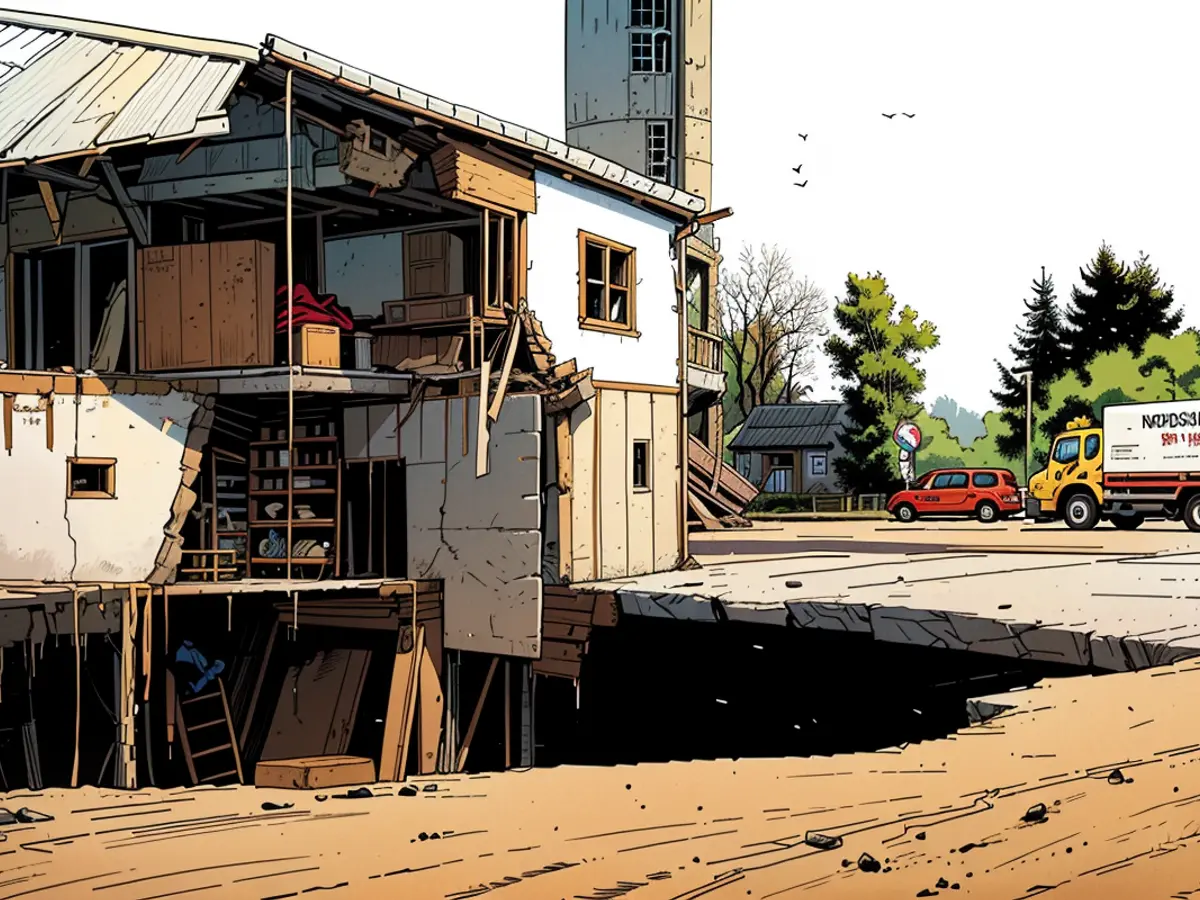Natural disasters - Earthquakes remain a constant danger in Thuringia
In this year, a total of 12 landslides have been registered in Thuringia. "This number does not appear significantly higher than in previous years at the moment," said a spokesperson for the Thuringian State Office for Environment, Mining and Nature Protection (TLUBN). It remains to be seen whether the number of landslides will increase due to the high rainfall amounts of the past months. Currently, the situation is normal, according to the circumstances, no more events than in previous years have been detected.
In general, a clustering can be observed in Spring and winter. This is likely due to more groundwater in these months. Therefore, it is worth waiting to see if the weather of the past months will have an effect. Landslides can occur throughout the year.
Large parts of Thuringia could be risk areas
The highest density of landslides is therefore located at the southern edge of Harz and Kyffhauser, at the northern and southern edges of the Rennsteig, and in the area of the salt mines in Southern Thuringia. The northern and western edges of the Thuringian Basin are also strongly affected.
Almost two-thirds of the Thuringian land area could be influenced by such events, according to the spokesperson. Affected areas in this year included Ichstedt, Lengenfeld under Stein and Artern in Northern Thuringia, Ilmenau-Roda and Leina in Southern Thuringia, and Bottendorf, Schnepfenthal and Hauenhof near Bad Salzungen.
No warning signs
Landslides, according to the office, are caused by the dissolution of water-soluble salts, sulfates, and carbonates in the soil. Currently, there are approximately 21,000 so-called subrosion objects recorded in the Free State, which include landslides, subrosion pits, fissures, and landslide sources. According to the current carting project, several thousand more objects could still be added. Subrosion refers to the underground erosion of rocks, for example, through groundwater.
There are no warning signs for landslides, according to experts. In known risk areas, the Land Thuringia and experts will conduct exploration measures and install point warning systems. The most prominent landslides in urban areas occurred, according to TLUBN, especially in the year 2012, at that time, for example, in Schmalkalden, Tiefenort and in Nordhausen-Salza. In Bottendorf, a large landslide was recorded in 2021, and in Oberrohn, intensive subsidence has been observed in the area of a railway line for the past 30 years.
Numerous repairs to roads required
For the Thuringian Road Administration, landslides are also a problem. Repairs were necessary at several locations this year - for example, near several places in the Nordhausen district. In Wolfsgefärth in the Greiz district, an Erdfall section was covered with a steel concrete plate.
Monitoring was carried out on the B4 between Erfurt and Andisleben for six years due to a suspected landslide. No indications of subsurface activity were found during this time. Planners of construction projects - from water and sewage pipes to buildings and railway lines - are advised by TLUBN experts. Additionally, a hazard warning map is currently being created, according to TLUBN.
If one wants to build in a landslide area, a soil investigation should be carried out first. Damages from landslides are typically not covered by household insurance, instead, taking out an elemental damage insurance policy is necessary. On the TLUBN website, there are brochures with tips for behavior in case of landslides.
- Despite the high number of landslides in Southern Thuringia, particularly around Kyffhäuser, the Thuringian State Office for Environment, Mining, and Nature Protection (TLUBN) has not deemed this a cause for horror imagination yet.
- In the event of an emergency due to a natural disaster like a landslide in Communes of Southern Thuringia, such as Ichstedt or Artern, residents should refer to the TLUBN's brochures for advice.
- The recent spring rainfalls in Thuringia could potentially trigger a catastrophe, as the high rainfall amounts have led to more groundwater, which in turn increases the likelihood of landslides, especially near the Rennsteig and Southern Thuringia's salt mines.
- The emergency services in Thuringia should closely monitor potential risk areas, such as near railways like the one in Oberrohn, where intensive subsidence has been observed for decades, to prevent any potential disaster.
- The occurrence of landslides in Thuringia is not limited to spring and winter; the natural disaster can happen throughout the year, making constant monitoring necessary to protect the environment and properties in the region.








